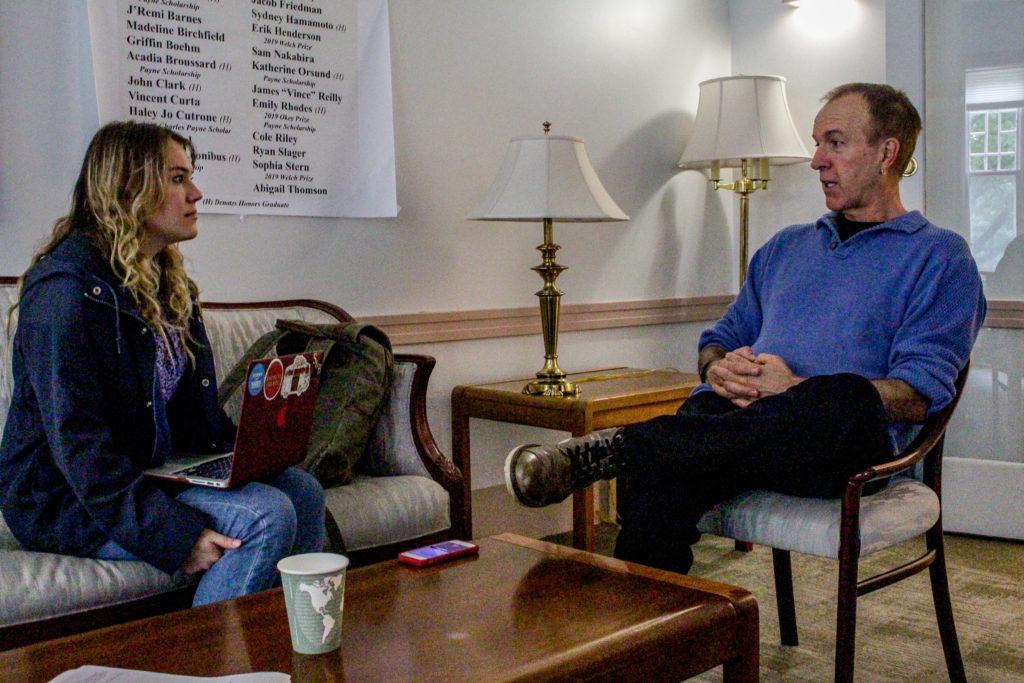By Anneliese Stattelman
stattelm@grinnell.edu
This past Thursday, Rob Nixon became Grinnell’s seventh Connelly Lecturer. Nixon, an environmentalist nonfiction writer, holds the Barron Family Professorship in Environmental Humanities at Princeton University and is the author of four books.
His articles have appeared in many publications including The New Yorker, Atlantic Monthly and The Guardian.
Growing up in South Africa, Nixon had an outdoorsy childhood and was very passionate about the environment.
“I came to the environment before I came to climate change,” he said.
With a background in postcolonial studies in third-world literature and film, Nixon had a unique viewpoint for his environmental research.
“What I was finding was there was a certain perception of environmentalism as wilderness dominated, and then when I looked at other writers in Africa, the Carribbean, India, the Middle East, their idea of what was environmental was quite different and had a lot to do with questions of environmental justice, uneven burdens of toxicity and unequal access to resources.”
Nixon explores these themes in his most recent and prize-winning book Slow Violence and the Environmentalism of the Poor.
“I’m interested in questions of environmental time and how they register in literature and language. I was trying to do two things here: first, try to grapple with the quandary of how some of the most damaging processes on the planet particularly environmentally are also deficient in spectacle—they’re low in dramatic events,” said Nixon.
Nixon discussed the disparity between what looks like violence, and the deeper layers of incremental violence within climate change. “If you think of something like climate, or the melting of the glaciers … they cause a lot of damage and a lot of harm and death, but they’re incremental and attritional so they lack the cinematic spectacle that we associate with a nuclear attack or with the twin towers [during] 9/11,” he said.
“We’re kind of groomed culturally to think of violence as hypervisual. How we tend to think of a war being bracketed in time, when the war begins, when the war ends, but actually the war materials tend to have an intergenerational impact on public health. So that would be another example of slow violence that is not normally perceived as violence.”
Nixon’s research also explores the culture of environmental stewardship coming out of poor communities. “For a long time there was a dominant perception that environmentalism was kind of a boutique interest of the well-off. People cared about the environment because they could afford to. I’m interested in excavating other traditions of environmental awareness, activism, stewardship, coming from embattled communities and to try to push back against this idea of environmentalism as the province of the elite,” said Nixon.
Nixon uses his writing as a form of activism, and is a great believer in the power of art and ideas to change what’s perceived as normal and acceptable in society.
“One of the ways artists can do that is through defamiliarization, through making what we think of as normal life seem abnormal by disturbing it. What they can do is they can offer different ways of imagining the present as well as the future. It’s these different forms of imagining that I think are crucial, particularly at a time when there is such a premium put on the extractive present like making money off nature now in an unregulated way, and the fallout of that,” he said.
Nixon believes the way activists approach environmental justice is changing.
“I do take a lot of heart from the energy and inventiveness of the current efforts to mobilize, a lot of heart from the Green New Deal and the idea that there’s this dual emphasis on a conjoined effort to address both the climate emergency and rising inequality so that social justice and environmental justice are linked hand in hand, and I don’t think you can really address one without addressing the other. What I see in the air at the moment is a lot of people lining up behind the idea that there’s a need for systemic change … that the status quo is not working,” said Nixon.


































































